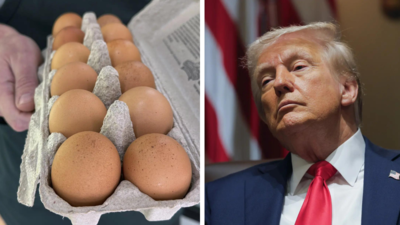
Is Donald Trump responsible for rise in egg prices in New York? (Photo: AP)
New York Governor Kathy Hochul has slammed President Donald Trump over rising egg prices, arguing that costs have soared even higher since he took office. "Since he was elected, the price of eggs is going up even higher," Hochul remarked.
Her comments come as soaring egg costs continue to worry consumers and the agriculture industry, with officials in Washington scrambling to assign blame.
"Their own elected leaders betrayed them– on day one the Trump administration promised the prices are gonna go down. Do you know what the cost of eggs in New York city are, if you can even find them?" she said in a podcast to MSNBC.
"It went up 40% since Trump was elected- instead of going down they are going up even higher," she added.
The US Agriculture Department predicted that egg prices could surge by more than 40% in 2025, as the Trump administration outlined its strategy on Wednesday to combat bird flu and mitigate rising costs.
Agriculture Secretary Brooke Rollins said an additional $1 billion investment in biosecurity measures, farmer aid, and research, supplementing the $2 billion already spent since the outbreak began in 2022.
The ongoing bird flu epidemic has led to the culling of more than 166 million birds, mostly egg-laying chickens, driving egg prices to an all-time high of $4.95 per dozen. Since the beginning of this year alone, over 30 million egg-laying hens have been lost.
What farmers do to stop bird flu?
Since the devastating 2015 outbreak, egg and poultry farmers have implemented strict biosecurity measures, such as requiring workers to change clothes and shower before entering barns, sanitizing tools and vehicles, and preventing wild birds from spreading the virus.
However, the highly contagious nature of bird flu remains a challenge. The USDA is now working to identify the most effective protective measures and address vulnerabilities in farm biosecurity plans.
Egg prices expected to climb even higher
The USDA has revised its projections, now forecasting a staggering 41.1% increase in egg prices this year—double last month’s prediction of 20%.
In some areas, consumers are already paying over $12 per dozen. Since the outbreak began, prices have more than doubled, costing consumers an estimated $1.4 billion in 2023 alone, according to University of Arkansas economists.
Will the Trump plan lower prices?
Rollins indicated that consumers would need to wait before noticing changes in retail prices. The process involves several time-consuming steps: infected farms must eliminate deceased birds, thoroughly clean their facilities, and begin raising new flocks. Nevertheless, she remained positive about the plan's impact on prices.
"It's going to take a while to get through, I think in the next month or two, but hopefully by summer," Rollins said.
Industry leaders have welcomed the administration's efforts. Emily Metz, president of the American Egg Board, said she is encouraged by the focus on improving biosecurity while exploring vaccine development as a long-term solution.
Where is the money going?
According to the Associated Press, the Trump administration’s plans to address the ongoing bird flu crisis and soaring egg prices includes a $1 billion investment aimed at strengthening farm biosecurity, providing financial relief to affected farmers, and researching potential long-term solutions.
- $500 million will be allocated to help farmers implement stricter biosecurity measures to prevent further outbreaks.
- $400 million will go toward additional aid for farmers who have lost flocks due to avian flu, ensuring they can restock more quickly.
- $100 million will be directed toward researching and developing potential vaccines and therapeutics for poultry, as well as reviewing animal welfare regulations such as California’s voter-approved cage-free egg requirement, which the administration considers restrictive.
The USDA has already compensated farmers with $1.2 billion for the birds that had to be slaughtered in an effort to contain the outbreak. The new aid package will continue to support these payments while expediting the repopulation of flocks.
Egg imports unlikely to make a big impact
In an effort to stabilize supply, the administration is negotiating to import 70-100 million eggs in the coming months. However, with US farms producing 7.57 billion table eggs last month alone, these imports are unlikely to make a substantial difference in the market.
The Trump administration has suggested that vaccines could play a role in reducing the number of birds culled during future outbreaks. However, no poultry vaccines have been fully approved for widespread use in the U.S. industry. Current prototypes require individual injections for each bird, making them impractical for large-scale farms. Additionally, vaccinated birds could pose a risk to exports, as many countries impose trade restrictions on vaccinated poultry.
Hochul, who has been vocal in her criticism of the Trump administration’s earlier sharing a post on X , wrote: “New York House Republicans are going all in against their own constituents and the health care they rely on. This is about your grandparents in nursing homes, your parents who need insulin, and your loved ones fighting cancer. And Republicans will have to answer for it.”

 1 month ago
12
1 month ago
12










 English (US) ·
English (US) ·